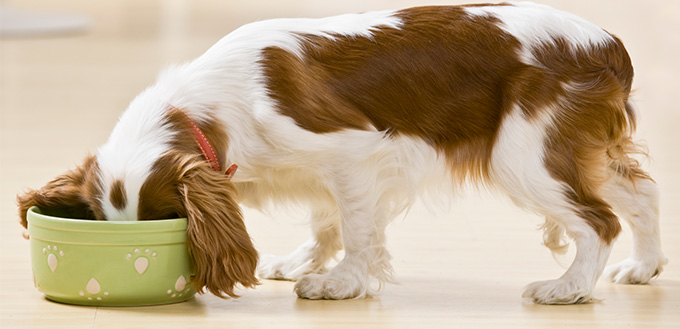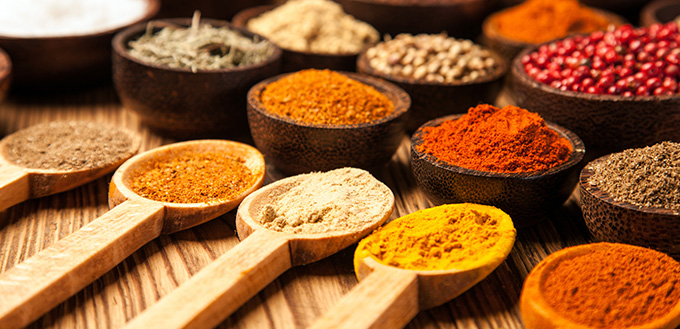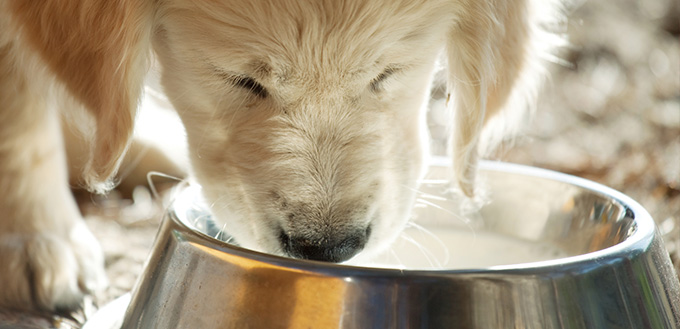No matter what type of dog you own, one of your main priorities will be making sure that he has a healthy and nutritious diet. There are many reasons why you may want to consider adding spices to your dog’s diet. Some pets are notoriously fussy when it comes to food, and so you may be searching for something that makes their meals taste nicer. Of course, there are also lots of health benefits that are associated with the various spices available today. However, not all spices are safe for dogs to consume. With that being said, below, we are going to take a look at some of the herbs and spices that are safe to use for dog food seasoning, as well as those that are unsafe.
Related Post: Best Dog Food Toppers

Spices You Can Add To Your Dog’s Food
- Fresh parsley
Not only will this herb enhance the taste of your dog’s food but it also provides a number of benefits. When dogs consume this herb, they are benefitting from a high amount of minerals, vitamins, and antioxidants. Parsley can, therefore, assist with dietary and dental issues, as well as improving organ function throughout the body. In fact, it also helps to soothe an upset stomach through flushing out toxins.
- Oregano
Is oregano safe for dogs? The short answer to this question is ‘yes’ – it is. Research has shown that oregano has antifungal properties. It can also help with gas, diarrhea, and digestive problems too.
Related Post: Best Calcium Supplements for Dogs
- Rosemary
Next, we have rosemary, which is not only incredibly versatile but it offers a number of benefits. You can add this to your dog’s food in the dried form or you can add the fresh herbs. If you add dried rosemary, you do not have to worry about losing any of the nutrients and vitamins, which is not always the case with other herbs and spices. Rosemary is high in fiber, iron, calcium, and vitamin B6. It also features anti-allergic, antiseptic, and anti-inflammatory properties, which promote good health and fend off disease. If that was not enough, the herb can also boost blood flow to the brain, which results in less damage to your pet’s nervous system as your dog gets older.
Related Post: Best High Fiber Dog Food
- Basil
Another herb that is easy to grow, readily available in dried form, and great to add to your dog’s food is basil. Basil is filled with essential minerals and vitamins, as well as beneficial oils, electrolytes, and phytonutrients. The herb is good for overall health and preventing disease because it is an antioxidant. It is also highly beneficial for dogs with arthritis. This is because it contains high quality of beta-caryophyllene, which is known to lower discomfort and pain in dogs suffering from this condition.
- Ginger
Finally, we have ginger, which can be served in a variety of ways, from being ground and mixed with your dog’s food to being chopped in chunks and served this way. One of the main benefits associated with finger is that it improves the absorption process of vitamins and minerals from food. It also helps with digestion by alleviating nausea and pain if your dog has a stomach upset. Ginger can also improve the circulatory system and help fight off disease if consumed regularly.
Related Post: Best Dog Food for Sensitive Stomachs

Spices You Should NOT Add To Your Dog’s Food
Now that you are aware of some of the foods that can be added to your dog’s diet, let’s take a look at some of the herbs and spices that are dangerous, and therefore, need to be avoided.
So, what herbs are not good for dogs?
- Nutmeg
Nutmeg should never be used to flavor your dog’s meals. This is because it can cause agitation in the nervous system and severe stomach excited. Moreover, dogs can become overly excited once consuming nutmeg, which can then result in exhaustion. There have been cases whereby dogs have died after consuming nutmeg, so it really does need to be avoided at all costs.
- Cocoa powder
Hopefully, you already know that chocolate can cause serious issues for dogs, and cocoa powder is the same. It can be harmful to your pet’s nervous system because it contains a compound that is similar to caffeine. Cocoa powder also needs to be avoided because it can contribute to heart trouble and kidney problems.
As humans, we use salt in virtually everything we eat. However, dogs don’t react in the same way as we do. This is because salt causes dehydration through increased urination and thirst. This can also cause diarrhea, nausea, and vomiting, especially if consumed in large amounts.
- Garlic
Another spice your dog should not consume is garlic. While there are some pet owners who use garlic to keep fleas away, we recommend avoiding garlic altogether because it can be toxic for some pets. If you have a reason to wish to incorporate garlic into your dog’s diet, you should definitely talk to your vet first to make sure it will not cause any issues with regards to your pet’s health.
- Onion
Onion powder can also cause vomiting and diarrhea, as well as an upset stomach. If that was not bad enough, it can damage the red blood cells and ultimately cause anemia. This is because onions contain disulfides and sulfoxides.

As you can see, there are a number of different spices and herbs that are safe to add to your dog’s food to improve the flavor of it. In fact, the spices mentioned even have health benefits associated with them, offering another compelling reason why you should think about adding these spices to your dog’s diet. On the flip side, though, this clearly cannot be said for all herbs and spices. As you can see, there are a number of varieties that are not suitable for your dog’s diet. If you are unsure, the best thing to do is get in touch with your vet for more information.
Sources:
- Foods That Can be Poisonous to Pets, The Humane Society of the United States
- People Foods to Avoid Feeding Your Pets, The ASPCA






